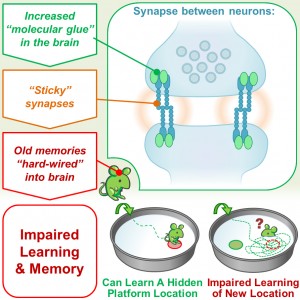http://news.ubc.ca/2014/05/26/sticky-synapses-can-impair-new-memories-by-holding-on-to-old-ones/
University of British Columbia researchers have discovered that so-called “sticky synapses” in the brain can impair new learning by excessively hard-wiring old memories and inhibiting our ability to adapt to our changing environment.
Memories are formed by strong synaptic connections between nerve cells. Now a team of UBC neuroscientists has found that synapses that are too strong or “sticky” can actually hinder our capacity to learn new things by affecting cognitive flexibility, the ability to modify our behaviours to adjust to circumstances that are similar, but not identical, to previous experiences.
“We tend to think that strong retention of memories is always a good thing,” says Fergil Mills, UBC PhD candidate and the study’s first author. “But our study shows that cognitive flexibility involves actively weakening old memory traces. In certain situations, you have to be able to ‘forget’ to learn.”
The study, published today in the Proceedings of the National Academy of Sciences, shows that mice with excessive beta-catenin – a protein that is part of the “molecular glue” that holds synapses together – can learn a task just as well as normal mice, but lacked the mental dexterity to adapt if the task was altered.

“Increased levels of beta-catenin have previously been reported in disorders such as Alzheimer’s disease and Huntington’s disease, and, intriguingly, patients with these diseases have been shown to have deficits in cognitive flexibility similar to those we observed in this study,” says Shernaz Bamji, an associate professor in UBC’s Dept. of Cellular and Physiological Sciences.
“Now, we see that changes in beta-catenin levels can dramatically affect learning and memory, and may indeed play a role in the cognitive deficits associated with these diseases,” she adds. “This opens up many exciting new avenues for research into these diseases and potential therapeutic approaches.”
More at link.

No comments:
Post a Comment